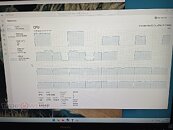- Joined
- Oct 9, 2007
- Messages
- 47,427 (7.51/day)
- Location
- Hyderabad, India
| System Name | RBMK-1000 |
|---|---|
| Processor | AMD Ryzen 7 5700G |
| Motherboard | ASUS ROG Strix B450-E Gaming |
| Cooling | DeepCool Gammax L240 V2 |
| Memory | 2x 8GB G.Skill Sniper X |
| Video Card(s) | Palit GeForce RTX 2080 SUPER GameRock |
| Storage | Western Digital Black NVMe 512GB |
| Display(s) | BenQ 1440p 60 Hz 27-inch |
| Case | Corsair Carbide 100R |
| Audio Device(s) | ASUS SupremeFX S1220A |
| Power Supply | Cooler Master MWE Gold 650W |
| Mouse | ASUS ROG Strix Impact |
| Keyboard | Gamdias Hermes E2 |
| Software | Windows 11 Pro |
Action RPG "Atlas Fallen" joins a long line of RPGs this Summer for you to grind into—Baldur's Gate 3, Diablo 4, and Starfield. We've been testing the game for our GPU performance article, and found something interesting—the game isn't optimized for Intel Hybrid processors, such as the Core i9-13900K "Raptor Lake" in our bench. The game scales across all CPU cores—which is normally a good thing—until we realize that not only does it saturate all of the 8 P-cores, but also the 16 E-cores. It ends up with under 80 FPS in busy gameplay at 1080p with a GeForce RTX 4090. Performance is "restored" only when the E-cores are disabled.
Normally, when a game saturates all of the E-cores, we don't interpret it as the game being "aware" of E-cores, but rather "unaware" of them. An ideal Hybrid-aware game should saturate the P-cores for its main workload, and use the E-cores for errands such as processing the audio stack (DSPs from the game), network stack (the game's unique multiplayer network component), physics, in-flight decompression of assets from the disk, etc., which show up in Task Manager as intermittent, irregular load. "Atlas Fallen" appears to be using the E-cores for its main worker threads, and this is found imposing a performance penalty as we found out by disabling the E-cores. This performance penalty is because the E-cores run slower than P-cores, at lower clock speeds, have much lower IPC, and are cache-starved. Frame data being processed by the P-cores end up having to wait for those from the E-cores, which causes the overall framerate to come down.





In the Task Manager screenshot above, the game is running in the foreground, we set Task Manager to be "always on top," so Thread Director won't interfere with the game. It prefers to allocate the P-cores to foreground tasks, which doesn't happen here, because the developers chose to specifically put work on the E-Cores.
For comparison we took four screenshots, with E-Cores enabled and disabled (through BIOS). We picked a "typical average" scene instead of a worst case, which is why the FPS are a bit higher. As you can see, with E-Cores enabled are pretty low (136 / 152 FPS), whereas turning off the E-Cores instantly increases performance right up to the engine's internal FPS cap (187 / 197 FPS).
With the E-cores disabled, the game is confined to what is essentially an 8-core/16-thread processor with just P-cores, which boost well above the 5.00 GHz mark, and have the full 36 MB slab of L3 cache to themselves. The framerate now shoots up to 200 FPS, which is a hard framerate limit set by the developer. Our RTX 4090 should be capable of higher framerates, and developers Deck13 Interactive should consider raising it, given that monitor refresh-rates are on the rise, and it's fairly easy to find a 240 Hz or 360 Hz monitor in the high-end segment. The game is based on the Fledge engine, and supports both DirectX 12 and Vulkan APIs. We used GeForce 536.99 WHQL in our testing. Be sure to check out our full performance review of Atlas Fallen later today.
View at TechPowerUp Main Site
Normally, when a game saturates all of the E-cores, we don't interpret it as the game being "aware" of E-cores, but rather "unaware" of them. An ideal Hybrid-aware game should saturate the P-cores for its main workload, and use the E-cores for errands such as processing the audio stack (DSPs from the game), network stack (the game's unique multiplayer network component), physics, in-flight decompression of assets from the disk, etc., which show up in Task Manager as intermittent, irregular load. "Atlas Fallen" appears to be using the E-cores for its main worker threads, and this is found imposing a performance penalty as we found out by disabling the E-cores. This performance penalty is because the E-cores run slower than P-cores, at lower clock speeds, have much lower IPC, and are cache-starved. Frame data being processed by the P-cores end up having to wait for those from the E-cores, which causes the overall framerate to come down.





In the Task Manager screenshot above, the game is running in the foreground, we set Task Manager to be "always on top," so Thread Director won't interfere with the game. It prefers to allocate the P-cores to foreground tasks, which doesn't happen here, because the developers chose to specifically put work on the E-Cores.
For comparison we took four screenshots, with E-Cores enabled and disabled (through BIOS). We picked a "typical average" scene instead of a worst case, which is why the FPS are a bit higher. As you can see, with E-Cores enabled are pretty low (136 / 152 FPS), whereas turning off the E-Cores instantly increases performance right up to the engine's internal FPS cap (187 / 197 FPS).
With the E-cores disabled, the game is confined to what is essentially an 8-core/16-thread processor with just P-cores, which boost well above the 5.00 GHz mark, and have the full 36 MB slab of L3 cache to themselves. The framerate now shoots up to 200 FPS, which is a hard framerate limit set by the developer. Our RTX 4090 should be capable of higher framerates, and developers Deck13 Interactive should consider raising it, given that monitor refresh-rates are on the rise, and it's fairly easy to find a 240 Hz or 360 Hz monitor in the high-end segment. The game is based on the Fledge engine, and supports both DirectX 12 and Vulkan APIs. We used GeForce 536.99 WHQL in our testing. Be sure to check out our full performance review of Atlas Fallen later today.
View at TechPowerUp Main Site



 'looking forward to the performance test '
'looking forward to the performance test '



